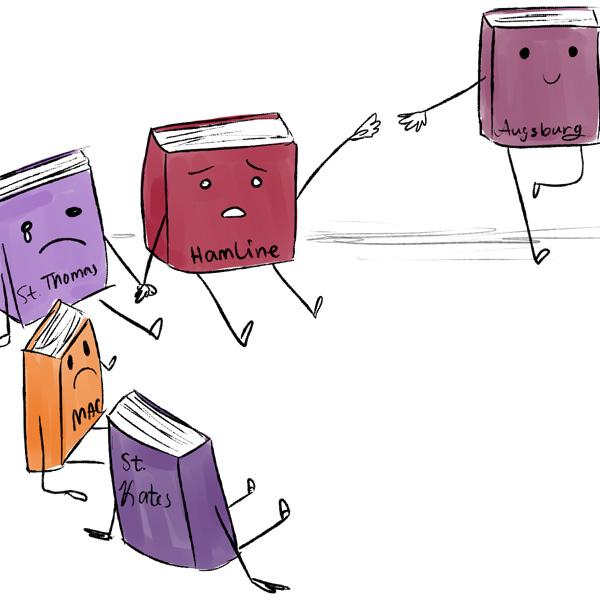Augsburg is leaving CLIC
Augsburg is removing itself from the CLIC program, but what does that mean for Hamline?
February 22, 2017
For 49 years, Augsburg has been a part of Cooperating Libraries in Consortium (CLIC) along with Hamline and other founding schools, but by June 30 they will leave the program. In response to this, Hamline administration has asked Bush Library for an evaluation of their membership, which will be sent to them in the next couple of weeks.
CLIC costs Hamline and the other colleges in CLIC 160,000 dollars in annual fees for their service. Augsburg will be saving these annual fees by leaving CLIC, losing the twenty-four hour delivery service for books from six of the surrounding colleges and the 9,981 journal articles including the online full-text articles CLIC provides.
Augsburg had to declare their withdrawal from the CLIC program a year in advance. Hamline hasn’t declared any intention of leaving and as of now Hamline Administration is only evaluating the CLIC program and its services.
“The impact on students and faculty would be the speed they could get texts from other libraries and their ability to find what the other libraries have,” Hamline University Librarian Terry Metz said.
If Hamline was to leave the CLIC program they would go through a central node called Minitex to receive outside texts. This would cause student and faculty to wait up to at least two days for hard copy books, and online texts would take at least a day to be received. Through CLIC it takes a day for books to be delivered to Hamline and online text can be instantly accessed online through the Bush Library’s e-resource management system.
The only other company that could compare to CLIC in their services is Minnesota Project for Automated Library Systems (MNPALS). MNPALS connects 75 different private and public libraries in Minnesota. MNPALS is over all more expensive than CLIC due to MNPAL’s many little charges that can range from 200 to 500 dollars for extraction of records and consulting fees.
“It would be bad to get rid of [CLIC] because it gives students access beyond their own university,” sophomore Abby Thompson said.
Many students are worried about their ability to search for online sources they need for research papers.
“I think CLIC is helpful,” first-year Cassia Egan-Lawless said. “Almost all the sources I used [for a freshman research papers] were online full-texts.”
Because of the CLIC program, Hamline has made sure not to buy certain texts they don’t need regularly if the other six schools nearby already own them. This allows Hamline to save money and space in their library. Five hundred thousand dollars worth of books are borrowed from other schools through the CLIC program annually.
“We can’t buy every book,” said Public Administration Professor Kris Norman-Major. “It’s nice that the other schools have other books because their programs have different emphasis and to be able to borrow them is convenient.”
A survey was sent out to all faculty to ask about their opinion on CLIC and whether or not they believe it is worth continuing their partnership. Forty-five percent of faculty responded to the survey. They all responded strongly in favor of CLIC and the serves it provides.
“I’m a big fan of CLIC and the services it offers students and faculty. I would be disheartened and saddened if it went away,” said English Professor Mark Olson.

